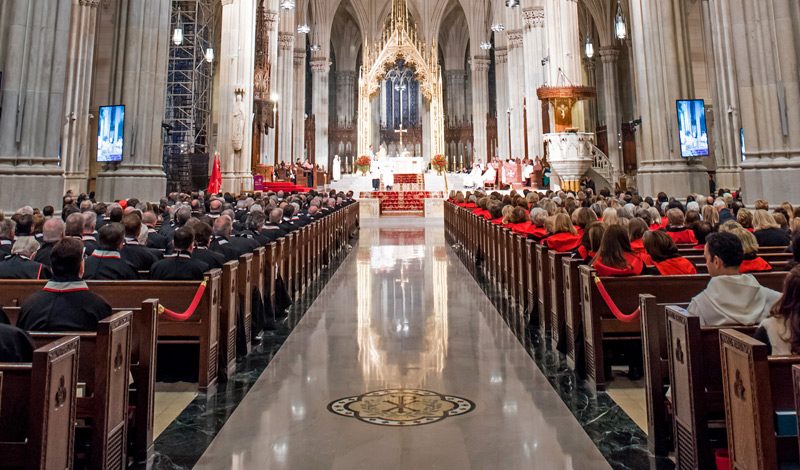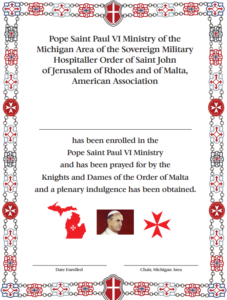Praying for the dead is an ancient Catholic practice with its roots going back to the Old Testament (see 2 Maccabees 12:43-46). A new Michigan Area ministry carries out this spiritual work of mercy through seeking plenary indulgences for the Order’s deceased members, malades, and others.
Launched in March, the St. Pope Paul VI Ministry is the fruit of a conversation that took place during the Order of Malta’s Pilgrimage for Life in Washington this past January. Steve Caron, KM (Boston Area), Robert Wilson, KM (Michigan Area), and Andy Smith, KM (Michigan Area) were discussing the recent visit to the Boston Area of the relics of St. Jude, and the plenary indulgence that could be obtained by the faithful who visited such relics. This brief exchange was the catalyst for the Michigan Area’s St. Pope Paul VI Ministry, which has already obtained over 100 plenary indulgences.
The ministry is named after St. Pope Paul VI, not only because he is an important saint of the Order, but also because he helped revive the indulgence process as an act of charity. Through this ministry, Michigan Area members perform an important work of mercy while being reminded of the Church’s beautiful teachings about praying for the dead.
The Catechism teaches that “All who die in God’s grace and friendship, but still imperfectly purified, are indeed assured of their eternal salvation; but after death they undergo purification, so as to achieve the holiness necessary to enter the joy of heaven. The Church gives the name purgatory to this final purification of the elect, which is entirely different from the punishment of the damned” (Catechism of the Catholic Church, 1030-1031).
To help these souls undergoing purification, the Church encourages the living to pray for the dead, including obtaining plenary indulgences. A plenary indulgence is “a remission before God of the temporal punishments due to sins whose guilt has already been forgiven, which the faithful Christian who is duly disposed, gains under certain prescribed conditions through the action of the Church, which, as the minister of redemption, dispenses and applies with authority the treasury of the satisfactions of Christ and the saints” (Catechism of the Catholic Church, 1471). Thus, when a plenary indulgence is gained, either for oneself or for a dead person, it removes all temporal punishment for that person from birth until the moment the indulgence was earned, rendering a soul as if newly baptized.
In 1968, St. Pope Paul VI began simplifying the rules on indulgences, redrafting the list of required works and prayers. His aim was to help Catholics see indulgences not as some sort of difficult project, only to be obtained under rare circumstances, but as a way to increase charity and a sense of repentance in the ordinary activities of daily life.
To obtain a plenary indulgence, there are three constants: Make a full confession of one’s sins in the Sacrament of Reconciliation, receive Holy Communion, and pray for the Pope’s intentions (see https://www.usccb.org/prayers/popes-monthly-intentions-2024). In addition, a fourth element, one of certain prescribed works, is required – for example, to make a pious Via Cruces (Way or Stations of the Cross) or to devoutly recite the Rosary in a church, in a family, with a religious community, or when several of the faithful are gathered. (For an excellent list of prescribed works, see http://indulgencecooperative.org/indulgence_plenary.asp.) Note that a single confession (20 days before or after the prescribed work) can be sufficient to earn several plenary indulgences, provided one’s interior disposition remains detached from all sin.
With help from the American Association head office, the Michigan Area maintains a list of recently-deceased Dames, Knights, and others associated with the Order. Each is assigned to a Michigan Area member who then fulfills the conditions for a plenary indulgence for that person. As they’re completed, the plenary indulgences are recorded in a registry. Whenever possible, the Michigan Area sends the deceased’s family a certificate attesting to the plenary indulgence. This attestation can be a powerful gift to a grieving family, a tangible sign that someone – often a total stranger – has obtained remission of all temporal punishment for the deceased, allowing him or her to enter into God’s glorious and eternal presence.
For more information about the Michigan Area’s Saint Pope Paul VI Ministry, please contact michigan.malta@gmail.com.
Follow the Michigan Area on FaceBook, Instagram, LinkedIn, and Twitter.





